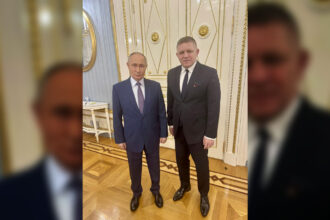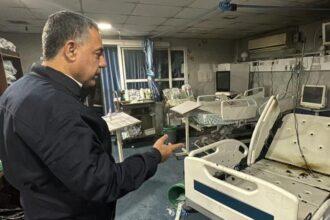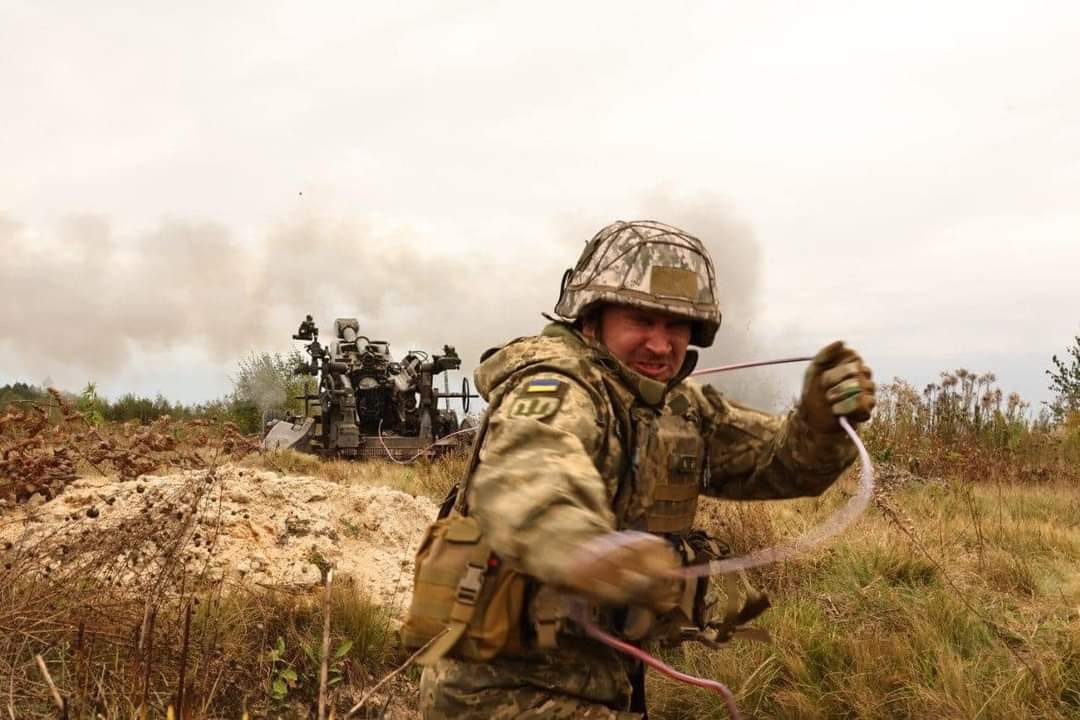How can a country with less soldiers defeat an enemy who doesn’t count their dead? Former Ukrainian defense minister has three parts to his answer.
As Russia gains incremental victories in the frontline, the West is increasingly calling for a Munich style agreement. We published an interview with former Ukrainian Defense minister Zagorodnyuk, in which he discussed the chances of Ukraine winning against Russia. Here are the main points of Zagorodnyuk.
Russia and Ukraine are not winners
Despite recent gains in Donbas, Russia’s performance in war remains disastrous. With over 600,000.000 personnel lost, and 40% of the state budget dedicated to the conflict, Russia’s territorial gains are at an unsustainable price of approximately 1,500 deaths per day.
Right now, there is a strategic deadlock: Russia cannot win. It crawls slowly, but its progress, measured in kilometres, falls far short of its strategic goal, which is to destroy the Ukrainian statehood.
Truthfully, Ukraine isn’t winning much right now, and its victory isn’t establishing peace on a long-term basis. This is not a Russian victory. The Russian navy is down to a tenth of what it used to be, and the situation is not perfect on land either.
The Russian regime is “all in” because they know this war is vital to them. However, despite having one of the largest military machines in the world, it has not been able to win a decisive war despite committing almost all its resources to the war.
If a NATO force spent half its budget on a war of invasion and achieved Russia’s performance, that would be a disaster.
Despite this, Russia’s propaganda machine convinces officials, analysts, journalists, and others that Russia is winning.
The war’s development created a trap for Ukraine
The Iran-Iraq War of the 1980s was the last similar war. Around 90% of the battlefield activities are concentrated at tactical depth, which is between zero and 30 kilometers in each side’s territory.
The main difference is that UAVs, FPV Drones, and Electronic Warfare are now the key differences. They largely replace traditional Artillery and MLRS, but operate in a similar area.
The Russians can now set up and recover their troops in the operational depths, hundreds of kilometers behind frontline. HIMARS used to disrupt these areas in the past, but only in limited quantities. Now, only the most valuable long-range drones are used to target high-value targets.
A war in which all the action takes place in the tactical zone cannot continue indefinitely. Ukraine’s biggest problem is the extreme exhaustion in its personnel. This situation must be changed. Russia has an advantage at the moment, since deaths are not important to them. Ukraine can win if it can penetrate the strategic depths. This is why Ukraine demands that the West allow long-range attacks into Russian territory.
Ukraine’s victory plans is realistic, but it needs resources
Zelenskyy’s victory plan has a classified operational component, but certain things can be deduced. This plan has been a long-awaited one for Ukraine, and its existence is a great plus.
The plan must transform the war paradigm into more result-oriented, operations aimed at liberating territories. Is it even possible? Absolutely. Must it be done? Absolutely. Holding the ground is a very weak strategy that will not get us anywhere.
Technically and organizationally, Ukraine’s success can be achieved. But Ukraine is dependent on the west in terms of funding and critical weapons systems.
Ukraine has already demonstrated its capability with three successful liberation missions – Kharkiv (2022) Kherson (2022) and Kursk (2024). Each was different, because both sides are constantly adapting.
The recent Kursk incident shows that surprises are still possible, but they can’t always be guaranteed.
To win, Russia must start failing its operations and Ukraine must start succeeding. In contrast to the sweeping offensives of World War II, victory is likely to come from a series of serious operations. Putin will lose the war if they succeed. The question of where the war ends becomes secondary. It’s more important that you change the course of the war.
Three keys to winning in operations
Ukraine must be able to conduct full-scale combined arm campaigns with the necessary capabilities. Some long-range weapons and air capabilities owned by our partner countries are competitive as of late 2024. However, their future availability is uncertain.
The most important changes are:
* Long-range attack capability: No NATO General would claim that military success was possible without striking enemy terrain. It’s impossible to win if you don’t strike Russian territory. Russia launches everything from its territory.
* Air power: Russia uses around 900 gliding-bombs per week. Planning without considering airpower is unrealistic. No NATO command would plan for a modern conflict without first achieving air superiority, or at least parity.
* New technologies, including unmanned platforms, AI systems, electronic warfare systems (especially in autonomous systems and optical identification). These are improving literally every day.
There is no one magic weapon
You don’t just get a weapon and win the war. You can win operations by combining weapons that allow certain types of operations. A series of victories can lead to a successful political outcome.
Looking at the war’s evolution, in early 2022 Ukraine liberated half of its occupied territory primarily using Soviet legacy weapons. By the end of 2022, these weapons were mostly depleted and Ukraine began to transition to NATO systems.
In 2023 we still used about 50% of Soviet-standard equipment, but now, the vast majority is NATO equipment. This is a historic shift.
By the end 2022, Ukraine was already using drones in large numbers, and new operational methods were emerging. After initially lagging, the Russians caught up. It was a great opportunity for Ukraine to advance, but we didn’t do it for various reasons.
2023 was very distinct from 2022 and 2024 is quite different from both.
We’re at a critical moment for certain systems as we look ahead to 2025-2027. Key questions include:
* Will electronic war systems be able block FPV drone operation? If so, one type of war will be focused on electronic warfare.
* If FPV can still penetrate electronic war defenses, and we maintain real-time visibility on the battlefield, it will be a FPV-dominated battle – whoever has a better FPV ability will win.
* Can FPV extend beyond 30 km to hundreds of kilometers in range?
What about AI? We are seeing some interesting developments with the massive amounts of data that are being collected and analyzed both in Ukraine and Russia. This data processing will allow for serious computer vision capabilities.
* If these capabilities allow for completely autonomous weapons as many suggest, then we will see a robotic warfare that will make the current operations irrelevant.
NATO support is essential but insufficient
We have received significant budget assistance – tens and hundreds of millions of dollars. We wouldn’t be able even to talk about what we are talking about right now without that support. Ukraine would be in a very difficult situation, and the Russian occupation would extend further.
Many NATO generals and civil servants are working to help Ukraine every day. Many of them travel to our country and work with our Ministries. Their help is the only reason Ukraine exists and that 80% of its territory remains under government control. Its economy also continues to function.
We’re not yet on the road to victory. Escalation concerns delayed critical political decisions. In November-December of 2022, the US government believed that Russia was prepared for nuclear escalation. Overcautiousness actually encourages Russia to continue playing with nuclear threats.
The West delayed delivery of ATACMs by over a year, and F-16s by over two years. Ukraine missed out on huge opportunities to continue its counter-offensive and do better in 2023. Can Ukraine simply blame NATO? No, we need to deal with our own problems.
Ukraine still has the chance to achieve a positive outcome. The West has the resources to support a Ukrainian victory. There are no good reasons not to provide Ukraine with these resources. It’s not about resources, but about proper campaign and operational planning.
The Russian myth of invincibility
It is said that Russia can’t lose wars, because it has so much wealth. In reality, Russia lost more battles than it won. They have succeeded in convincing many people that the legend of Russian invincibility is true.
Take the Crimean War for example. It was the first war to be broadcast in real time via telegraph and was very unpopular in the West. People in London read the front-line news daily about logistical problems, failed battles, high casualties, etc. Everyone said that it was not going well, just like now. In 1856, Russia’s Black Sea Fleet was non-existent, and its regime was on the verge of collapse. The Tsar committed suicide.
What the world must understand
This war is about the future of the world, not Ukraine. The Biden administration was aware of this from the start, and emphasized its historical significance when justifying support.
When people in the West complain about being tired, they should spend some nights under Russian drone strikes. The fatigue they feel from reading the news is nothing in comparison to what Ukrainians are experiencing.
Many people get their information from the wrong sources. They spread myths such as Ukraine stealing Western weapons for money, which is nonsense, since the West does not provide money, but weapons. In the last three years, there hasn’t even been a hint of misappropriation of weapons. Other myths include the idea that Ukraine should cede its territory if they are not succeeding. But it is not a territorial war. Russia has too many resources to lose wars, which is a myth. It has lost more than won wars.
Often, it is forgotten that this war is bigger than Ukraine. It’s about future history. Many people fail to see that this isn’t about supporting Ukraine just because it’s in pain. This is about making sure the world doesn’t collapse – as it will if Russia wins.
Watch the video or read the interview in full.
Read More @ euromaidanpress.com




